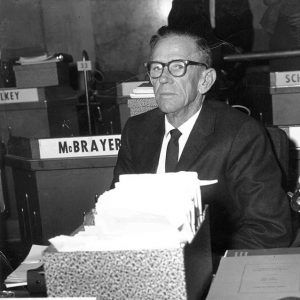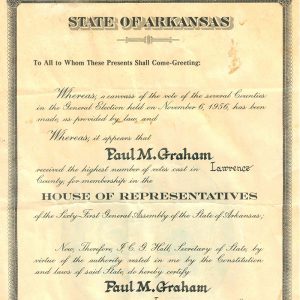calsfoundation@cals.org
Paul Miller Graham (1903–1976)
Paul Miller Graham was a member of the Arkansas House of Representatives from Walnut Ridge (Lawrence County). Graham worked for Ponder and Lingo Real Estate before running as a Democrat in 1954 for a seat in the Arkansas General Assembly. He served five consecutive terms.
Paul Miller Graham was born on July 26, 1903, likely at home, in the Water Valley Township in Randolph County, west of Pocahontas (Randolph County). His parents were Roxie McAfee Graham and John Jefferson (J. J.) Graham. His father was a farmer and broom maker in the area. Graham’s younger siblings were Margaret, Wiley, and Bruce Graham.
In the twelfth grade, Graham dropped out of school to work as a farmer. On January 5, 1929, twenty-five-year-old Graham married fifteen-year-old Mary Ann Smith. When the census was taken in 1930, they were living with Graham’s mother and father at 423 Free Street in Walnut Ridge, along with their infant son, John David (J. D.). Graham was listed as a common laborer and his father as a broom maker. By 1940, Graham, who was working as a farmer, had moved with his wife to Sedgwick (Lawrence County), and they had three more children: Carolyn Sue, Theron Thomas “Buddy,” and Talmadge. Graham had several additional careers during his adult life, including working for a lumber company, owning Paul Graham’s Grocery, and working for Ponder and Lingo Real Estate. By 1950, the family had moved back to Walnut Ridge and was living at 616 West Hazel Street.
In 1954, Graham ran as a Democrat for a seat representing Lawrence County in the Arkansas House of Representatives, which he won. Graham ran again and served for the next five consecutive terms, facing few opponents. Graham served on various legislative committees, including the Legislative Audit Committee. The topic of integration, specifically school integration, loomed large during his time in the House. On August 13, 1955, Graham was recorded as being present at a gathering to discuss the desegregation of schools in Hoxie (Lawrence County). While there is no documentation on Graham’s position on integration, his son Talmadge recalled his father as being for it, saying, “He believed every child had the right to a good education.”
Graham’s humble beginnings caused him to be thought of as a “man of the people” by the citizens of rural Lawrence County, which was reflected in the bills and issues to which he devoted himself. Graham proposed a bill in 1955 that would require motor vehicle liability insurance before being allowed to purchase an automobile license, going beyond the drivers’ responsibility law at the time that prohibited a driver from using a vehicle after an accident until proven able to meet possible judgments. In 1957, Graham and Representative John Ferguson of White County introduced a bill that would set a $55 monthly minimum for recipients of the state’s old age assistance. Graham was noted in 1960 as being in support of a constitutional amendment to lower the voting age to eighteen. In 1963, Graham showed support for a bill authored by Representative Glenn Walther of Pulaski County to permit machine counting of ballots in state elections as a substitute for voting machines by pointing out that “such a law would be valuable in counties where voters may decide against use of regular voting machines.”
An important issue throughout Graham’s time in the legislature was taxation. In 1955, he spoke of his supporting a bill attempting to equalize tax assessments by withholding state aid from school districts, cities, and counties whose assessments did not approximately reach a prescribed standard. Graham was quoted saying that “the big landowners and oil men are against this bill but I still think it’s a good one.” In 1957, Graham introduced a bill that would change the procedure for allowing gasoline used in agricultural equipment to have a special two-cent-per-gallon rate, rather than the general six-cent-per-gallon tax, eliminating the necessity of farmers having to apply for tax refunds. In 1959, Graham introduced a bill to give Arkansas taxpayers a deduction of up to $400 of federal income tax paid. Although vetoed by Governor Orval Faubus on the grounds the state would lose too much revenue, Graham continued to support similar bills.
Running in 1964, Graham was defeated in the first primary in a six-man run off, ending his political career. Graham went to work for Walcott State Park, now known as Crowley’s Ridge State Park, presumably as the caretaker. After retiring from the park after a few years, Graham returned to Walnut Ridge, where he lived with his wife until his death on January 7, 1976. Graham is buried at the Masonic Cemetery in Pocahontas.
For additional information:
“By Committee Ballot County Okayed.” Northwest Arkansas Times, January 17, 1963, p. 1.
Harris, Rodney W. “A Town Divided: Leadership at Hoxie.” Ozark Historical Review 42 (Spring 2013): 117–128.
Hatch, Leon. “Would Hike Gas Tax to Benefit Cities, Counties.” Hope Star, January 16, 1957, pp. 1,6.
“House Okays 2 Income Tax Relief Measures.” Hope Star, February 18, 1960, p. 7.
“Tax on Trade Stamp Is Postponed.” Hope Star, January 23, 1957, p. 6.
Emily Housdan
Little Rock, Arkansas
 Politics and Government
Politics and Government World War II through the Faubus Era, 1941 through 1967
World War II through the Faubus Era, 1941 through 1967 Paul M. Graham
Paul M. Graham  Graham's Diploma
Graham's Diploma 



Comments
No comments on this entry yet.